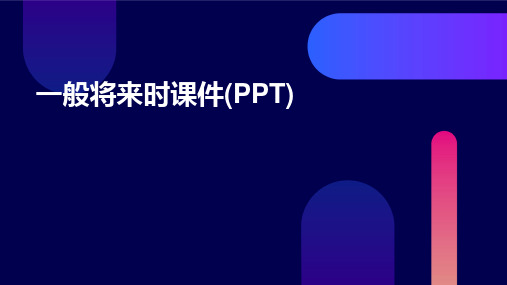一般将来时PPT课件
(完整版)一般将来时课件(PPT)

2.与“next一家” 连用
next
time year week month term Monday at 7:00 next Sunday morning ……
2.He will find some meat in the fridge soon. (变一般疑问句) W __i_ll he _f_in_d _a_n_y_ meat in the fridge?
3.She will stay there in a week. (对划线部分提问) __H_o_w _s_o_on_ w_i_ll__ she _s_t_a_y_ there?
We will/shall go to Beingjing next week.
He will go to Beingjing next week
(2).变一般疑问句和否定句:
They will have an English party next week. Will they have an English party next week?
2. be going to+do可表示事先计划的意图,而 will 则表示说话人当时决定的意图;
We're going to drive you home after the meeting. Don't call a taxi. We'll drive you home.
I feel ill now, and I'll go to see the doctor. I'm going to see the doctor this evening.
一般将来时课件(PPT)

“be able to”表示将来有能力做某 事时,使用一般将来时形式,例如“I will be able to help you”。
情态动词如“can”、“may”、 “must”等,在一般将来时中通常直 接加动词原形,例如“I can swim”。
03
一般将来时在句子中的运用
陈述句中的使用
表示将要发生的动作或存在的状态
纠正方法
应使用正确的将来时形式,如 "He will go to the park tomorrow." 或 "He is going to the park tomorrow."
忽略动词变化规则
错误示例
They will play football in the future.(忽略了动词play在将来时中的变化)
纠正方法
在将来时中,应使用正确的助动词或情态动词形式,如 "I will be able to help you with your homework." 或 "I can help you with your homework."
错误示例
He will must finish his work before leaving.(错误地使 用了情态动词must)
作用
用于表示未来的计划、打算、预测、 假设等。
常见表达形式
will + 动词原形
表示将来的动作或状态,如“I will go to the park tomorrow.”(我明天将去公园。)
be going to + 动词原形
表示计划、打算或即将发生的动作,如“I am going to study hard this semester.”(我这 学期打算努力学习。)
一般将来时PPT课件

•一般将来时基本概念•一般将来时结构与用法•一般将来时时间状语及标志词•一般将来时与其他时态对比•一般将来时在各类从句中运用•一般将来时误区及注意事项•总结回顾与拓展延伸目录01一般将来时基本概念定义与特点定义特点表现形式will + 动词原形be going to + 动词原形现在进行时表示将来预测未来计划与安排条件与假设030201使用场景02一般将来时结构与用法主语+ be not going to + 动词原形+ 其他成分主语+ be to not (非标准用法,尽量避免使用) + 动词原形+ 其他成分主语+ will not (won't) + 动词原形+ 其他成分Will + 主语+ 动词原形+ 其他成分?Be + 主语+ going to + 动词原形+ 其他成分?Be + 主语+ to + 动词原形+其他成分?(较少使用,多用于书面语)特殊疑问词动词原形特殊疑问词going to +成分?特殊疑问词to +(较少使用,多用于书面语)注意:在一般将来时的使用中,要注意区分不同语境和表达方式的细微差别,选择合适的结构进行表达。
同时,也要注意与其他时态的区分和联系,避免混淆使用。
特殊疑问句结构03一般将来时时间状语及标志词常见时间状语表示将来的时间状语表示计划或安排的时间状语标志词识别与运用04一般将来时与其他时态对比与现在进行时对比时间指向不同01动词形式差异02使用情境不同03时间基准差异动词形式变化使用情境区别时间范围不同动词形式区别使用情境差异05一般将来时在各类从句中运用在宾语从句中运用01 02定语从句的时态取决于它所修饰的先行词,如果先行词是将来时态,定语从句也使用将来时态。
如果先行词是过去将来时,定语从句则使用过去将来时。
定语从句中表示将来的时间状语有:tomorrow, next year, in the future 等。
06一般将来时误区及注意事项误区二过度使用“will”和“going to”。
一般将来时课件ppt(共17张PPT)

Jim going to
afternoon?
in the playground tomorrow
4. .Jim is going to play football in the playground tomorrow afternoon.
Jim going to play football tomorrow afternoon?
2)在浊辅音和元音后读/d/.
一般过去时, 要用动词过去式. Jim is going to play football in the playground tomorrow afternoon.
Jim is going to play football in the playground tomorrow afternoon. ⑵are变为were。
there were many beautiful flowers there. 一般将来时表示将来某个时间要发生的动作或存在的状态常与表示将来的时间状语连用
⑴am ,is变为was。
So she They to read some books.
What did they do in the park? 1)在清辅音后读/t/ .
(3).动词过去式变化规则
a)一般情况下,直接加ed.如:wash--washed, look---looked; b)以不发音字母e结尾的,加d.如:like---
liked, dance---danced; c)以“辅音字母+y”结尾的,变y为i再加ed. 如:study---studied;
food and (play) lots of games. They
(come) home at 4:30.
一般将来时PPT课件

一、单项选择
(C) 1. There __________ a meeting tomorrow afternoon.
A. will be going to B. will going to be C. is going to
shall常用于第一人称. shall
否定式:shall not = shan’t
will常用于第二、三人称,但在 will 口语中各种人称都可以用will.
否定式:will not = won’t
四、现_在___进__行___时态 + 表示将来的时 间状语也可以表示将来。
五、There be 句型的一般将来时态 的结构:there +is_g_o_in_g_to_ + be + 名词或there + will+ be + 名词。
begoingto表示根据主观判断将来肯定发生的事情表示根据主观判断将来肯定发生的事情will表示客观上将来势必发生的事情
The Simple Future Tense
一、一般将来时表示将来某一 时刻的动作,状态以及打算。 该时态一般与表示将来意义 的时间状语连用。如:
tomorrow, this month, the day
next week.
A. will be; is
B. is; is C. will be; will be D.
is; will be
(D) 4. There ________ a dolphin show in the zoo
tomorrow evening.
A. was B. is going to have C. will have D. is going
一般将来时ppt课件

02 一般将来时的基本用法
表示将来要发生的行为
要点一
常见的助动词“will”和 “shall”可以用于表示将…
“I will go to the store tomorrow.”(我明天要去商店。 )
要点二
“be going to”也可以用于表达 将来要发生的行…
“It is going to rain later.”(待会儿要下雨了。)
肯定句
I am going to swim in the afternoon.
否定句
They are not going to watch the movie.
疑问句
Are you going to meet your friend tomorrow?
主语+be to+动词原形
肯定句
You are to hand in your homework tomorrow.
表示邀请或建议
总结词
表示邀请或建议某人做某事,通常用于 口语交流中。
VS
详细描述
在口语交流中,我们经常使用一般将来时 态来表示邀请或建议,例如:“Would you like to come to my house for dinner tomorrow?”(明天你想来我家 吃晚饭吗?)或者“Let's go for a walk after dinner.”(晚饭后我们去散步吧。 )
02
在一些情况下,我们也可以使用“be going to”来表达将来时
。例如
It is going to rain.(将要下雨了。)
03
构成
They are going to graduate next year.(他们将于明年毕业。)
初中英语 一般将来时课件(PPT18张)

Ⅳ.一般将来时的被动语态
一般将来时的被动语态表示“…将要被…”,其常用的表达形式有以下几种:
一般将来时被动语态:
will/shall + be /get done (表示意想不到的要发生的事情)
be going to be + done (表示按计划或安排发生的被动动作) be about to be + done (指将要发生的事情)
2.They ________ an English evening next Sunday. A. are having B. are going to have C. will having D. is going to have
3.—Tell him about the news when he _______, John.
考点2:考察一般将来时的不同表达方式
1.– Will his parents go to see the Terra Cotta Warriors tomorrow? – No, ________ (不去).
A. they willn’t. B. they won’t. C. they aren’t. D. they don’t.
基本结构:
1.主语+will/shall+do sth 2.主语+am/is/are+going to+do sth
3. 主表语示+位am移/is的/ar动e+词do可ing用s现th 在进行时表将来 4. 主特语定+时do间sth和条件状语从句可用一般将来时表将来
5.主语+am/is/are+(about)+to+do sth 注:之所以不用be是因为这是一般将来时,而be还包括过去式的 was、were
2024版一般将来时时态课件

2024/1/30
12
在疑问句中的位置和功能
位置
在疑问句中,一般将来时通常将助动词“will”或“be”提至主语之前,构成 疑问语序,表示询问将来的动作或状态。
功能
疑问句中的一般将来时用于询问未来将要发生的动作或存在的状态,具有询问 和获取信息的功能。
2024/1/30
13
在感叹句和祈使句中的应用
01
02
03
04
疑问词 + will + 主语 + 动词 原形 + 其他成分?
例如:What will you do tomorrow? 你明天要做什么?
疑问词 + be going to + 动词 原形 + 其他成分?
例如:Where are you going to meet? 你们打算在哪儿见面?
2024/1/30
用法
表示将要发生的动作或存 在的状态,以及计划、打 算或准备要做的事。
例子
I will go to the park tomorrow.(我明天将去 公园。)
8
be going to+动词Байду номын сангаас形
构成
be going to+动词原形,其中be 动词随主语的人称和数的变化而 变化。
2024/1/30
16
缩写规则及注意事项
“will not”可以缩写为“won't”,但需要注意在正 式场合或书面语中,通常使用完整形式“will not”。
输标02入题
在缩写“won't”中,撇号(')代表省略的字母“o”, 而不是表示所有格或缩写。
01
03
- 1、下载文档前请自行甄别文档内容的完整性,平台不提供额外的编辑、内容补充、找答案等附加服务。
- 2、"仅部分预览"的文档,不可在线预览部分如存在完整性等问题,可反馈申请退款(可完整预览的文档不适用该条件!)。
- 3、如文档侵犯您的权益,请联系客服反馈,我们会尽快为您处理(人工客服工作时间:9:00-18:30)。
I
go on a trip with my friends tomorrow.
2)下个星ar期e一y你ou打算g去oi干ng嘛?t我o想去打篮球。
---Wahmatgodiong
next Monday?
---I towil
play basketbalwl. 或ill者:
---What l you do next Monday? ---I
5)plays, is playing 6)play,enjoy 7)are
8)Are having 9)singing,is singing,
sings 10)does ,do 11)are running
12)gets,is having .
1
一般将来时
.
视频2
学习目标:
1.一般将来时的概念。
3.特殊疑问句(也就是对划线部分提问) -----要用特殊疑问词what +一般疑问 句。
.
13
练一练: Practic
A、根据中文,完成句子,每空一词。 e
1)我打算明天和我的朋友去旅行。
I am going go on a trip with my friends tomorrow.
w或it者lol :
you meet at the bus stop at 10:30?
5)She is going to listen to music after school. (对划线部分提问)
she
.
after school? 15
改写句子
1)Nancy is going to go camping.(改否定句)
上期作业答案
• 1.is playing 2.is watering 3.is sleeping
• 4.is running 5.are having 6.am studying
• 7.is knocking 8.are swimming
• 1)am ,is 2)is 3)is singing 4)clean
They are going to watch TV.
will .
11
What are they going to do ?
They are going to dance.
will
.
12
一般将来时句式的变化规则:
1.变否定句—---在be/will后加not 。
2.变一般疑问句------将be/will动词提 前。(主语是第一人称I 时,变一般疑 问句时将I 变you)
.
5
Summer is coming! I am going to/will…
wear my sandals to the beach
swim
lie on the beach
What are you going to do /What will
you do ?
.
6
next week
What is he going to do next we He is going to go fishing.
4)We will meet at the bus stop at 10:30.(改一般 疑问句)
____you meet at the bus stop at 10:30?
5)She is going to listen to music after school. (对划线部分提问)
____ ____she ____ ____ ___._ after school?
play
basketball.
3--)-th你Isiws妈e妈eyk这oeiu个snr周dm末o?t去hei购sr物tgogo吗oi?ning是gt,. o她g要o去sh买o一pp些in水g果。
14
改写句子
1)Nancy is going to go camping.(改否定句)
Nancy
going to go camping.
2.一般将来时的构成。 3.与一般将来时连用的时间状语。 4.句式变化规则。 5.会灵活运用一般将来时。
.
3
一般将来时 (the future tense)
1.一般将来时表示在将来某一时间将要发生 的动作或存在的状态,也可表示将来某一 段时间内经常发生的动作或存在的状态。
2.结构: be going to +动词原形
will +动词原形
be going to
will
.
4
与一般将来时连用的时间状语
tomorrow 明天
this year 今年
the day after tomorrow 后天 next week 下周
soon 很快 不久
in the future 将来
in three days 三天后
some day 将来的某一天
will
.
7
What is she going to dSoh?e’s going to shop/ go shoppin
wil .
8
What is the cat going to do
will
.
9
It is going to drink/eat.
will
.
10
What are they going to do this evening?
2)I’ll help them.(改否定句)
I
help them.
3)I’m going to get up at 6:30 tomorrow.(改一 般疑问句)
to get up at 6:30 tomorrow?
4)We will meet at the bus stop at 10:30.(改一般 疑问句)
16
.
17
6.There is going to ___ a football match(比赛) this afternoon.
A. be B. are C. is D. am
7.Miss Zhang is going to ___ a burger for lunch.
A. eating B. eat C. ate D. eats
Nancy ____ going to go camping.
2)I’ll help them.(改否定句)
I ____ help them.
3)I’m going to get up at 6:30 tomorrow.(改一 般疑问句)
____ ____ ____to get up at 6:30 tomorrow?
